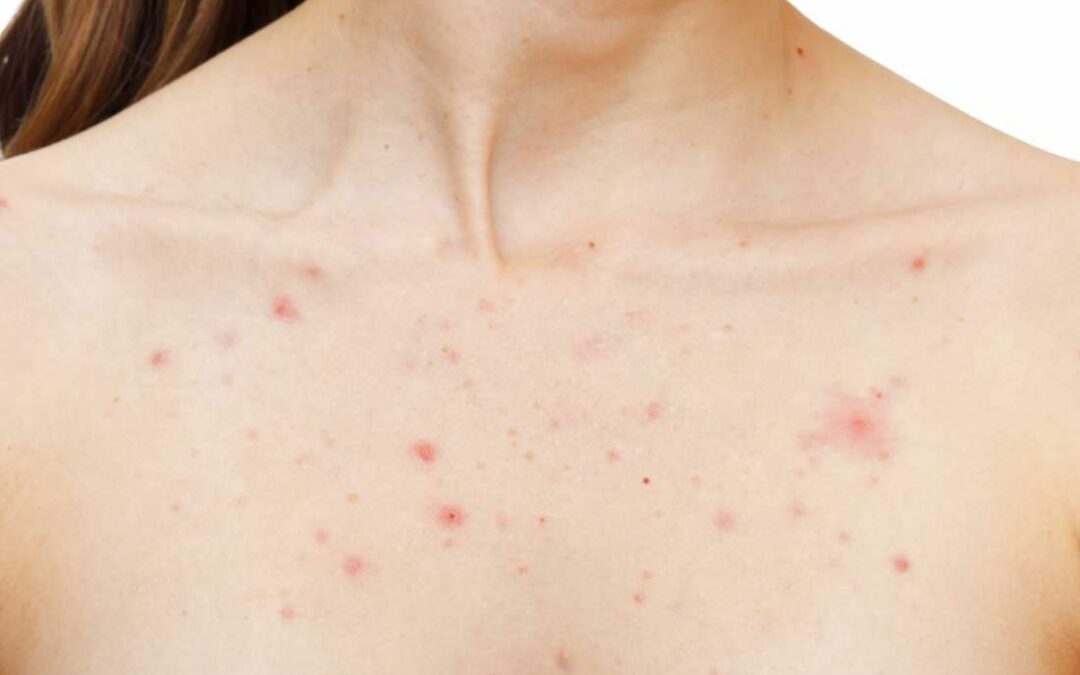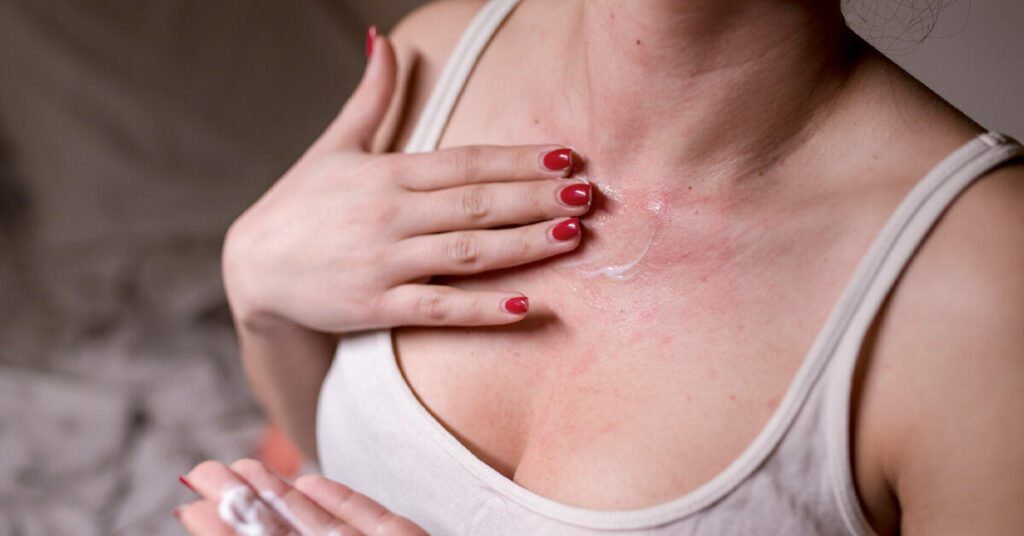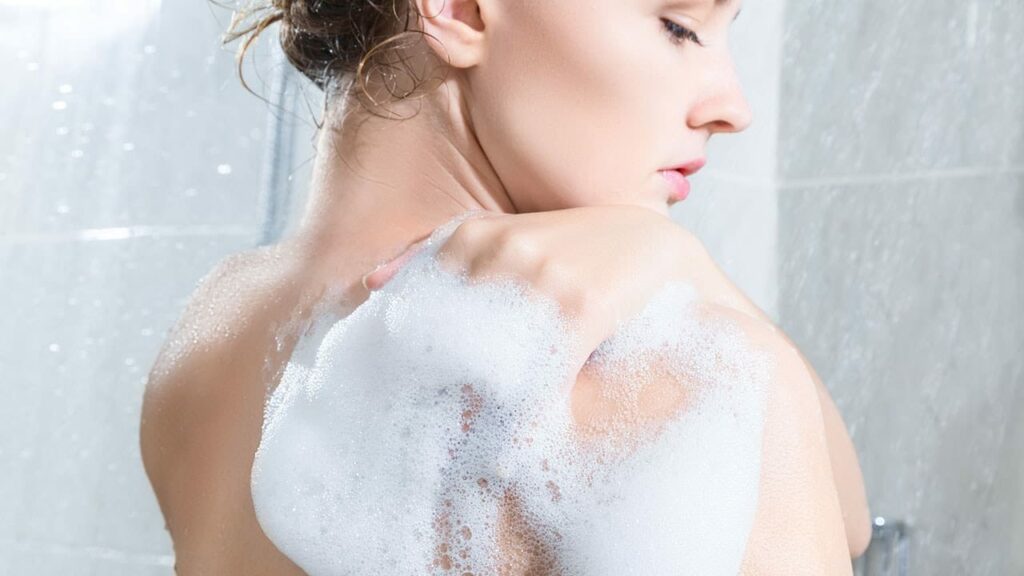Acne does not develop due to poor hygiene or dirty skin – it breakouts on your skin when dead skin cells clog your pores, allowing specific bacteria to reside on the skin, causing acne to pop up.
Since pores exist on the entire body, the root cause of acne development on your skin is generally the same for the whole body, such as your face, chest, back, other parts of the body. However, if acne is on your chest, you should go to a dermatologist at least once to confirm whether the root cause is the same or not and get treated, just in case you have a particular skin condition.
Knowing the causes of acne development on your skin will help you avoid such practice or use specific products. So, it’s better to get proper knowledge before it gets worse.
So let’s get started with the chest acne symptoms.
Chest Acne Symptoms
If the acne is caused due to clogging in the pores on your chest, then you’ll notice the following types of acne:
- Blackheads
- Whiteheads
- Pustules
- Pimples
- Cysts
In the worst case, people may develop cysts on their chest, which might be painful when touched.
Causes Of Chest Acne
There are some certain practices and factors that lead to acne development on your chest, such as:
- Skincare products – Traps the skin’s moisture leading it to clog the pores (humectants, occlusives, emollients, etc.)
- Cleaning products – Using soap, laundry detergents, or other hygiene products containing harsh chemicals that may irritate skin and cause inflammation.
- Clothing type – Fabric may trap the oil and rub against the skin, causing irritation and inflammation leading to acne.
- Excessive sweating – Wearing unbreathable clothing that traps moisture on the skin.
- Dehydration – Drinking less water leads to dry skin, causing increased sebum oil production, which clogs the pores, causing acne.
- Medications – These may affect the hormone regulation in your body, such as corticosteroids, lithium or testosterone.
- High Sugar Consumption – Consuming foods and drinks containing high sugar can cause acne in your body.
Other factors that may not only cause acne but make it worse are:
- Stress – It releases androgen hormones in the body, which stimulates oil glands and hair follicles, leading to clogging pores on the skin and may develop acne.
- Hormonal Changes – Due to puberty and pregnancy, your glands may produce excessive oil leading to acne development.
- Rough scrubbing – Crudely scrubbing your skin can cause inflammation and acne development.
- Diet – Skim milk, chocolate, and high carbohydrates foods can worsen acne.
The overproduction of sebum oil can also cause acne by glands or poor skin cell turnover. That’s why acne is more common among teenagers than in other age ranges. However, in some cases, people may develop acne later in life.
Effective Treatments For Chest Acne
There are some effective treatments available that can make the acne on your chest less noticeable, or you can completely get rid of it. In some cases, it may also help to avoid acne scars.
Based on the acne severity, the dermatologists may prescribe the following treatments:
Topical Medications
Tropical medications treat mild to moderate acne. They may come in the form of cream, lotion, or gel. Some of the most topical prescription medications are:
- Retinoids – At the beginning of the treatment, you’ll have to apply this medication to your acne-affected skin thrice a week in the evening. It prevents the clogging of hair follicles. However, it may cause skin dryness, increased sun sensitivity, and redness.
- Azelaic acid – Applying cream or gel containing twenty percent of azelaic acid twice a day may treat conventional acne. It has antibacterial properties and is generally prescribed during pregnancy or breastfeeding. It is available as both leave-on and wash-off products. The side effects of using creams having azelaic acid may include redness and minor irritation on the skin.
- Antibiotics – Apply topical antibiotics in the morning to the affected area. Mostly, it is recommended to be used along with retinoids and benzoyl peroxide to be applied in the evening, as alone it’s not much effective. It kills the skin bacteria while reducing your skin’s inflammation and readiness. However, long term use of antibiotics can cause bacteria to develop resistance against antibiotics, losing their effectiveness over time.
- Dapsone – You can use the gel containing five percent of dapsone twice daily to treat inflammatory acne. The side effects of using dapsone may include skin redness and dryness.
Oral Medications
Oral medications treat moderate to severe acne. They may come as a pill to be taken with water. Following are the commonly prescribed oral medications:
- Antibiotics – Use oral antibiotics to reduce bacteria. They are often combined with other drugs to reduce the risk of developing antibiotic resistance to the bacteria. But still, it increases the sun sensitivity of your skin.
- Anti-androgen agents – It blocks the effect of androgen on the oil glands. However, its side effects may include painful periods and breast tenderness.
- Combined oral contraceptives – It combines progestin and estrogen into an oral medication. FDA has approved the use of a 4-phasic oral contraceptive for acne treatment. However, you may gain weight, feel nausea and breast tenderness. It also increases the risk of breast cancer, cardiovascular problems, and cervical cancer.
- Isotretinoin – It is a derivative of vitamin A that helps treat severe acne, such as nodular acne. The possible side effects are inflammatory bowel disease, depression and severe congenital disabilities.
Therapies
Therapies may act either alone or together with the prescribed medications to treat the acne on your chest. Some of the useful therapies may include:
- Light therapy – It differs from person to person and requires multiple visits to your dermatologist.
- Chemical peel – Chemical solutions, such as glycolic acid, salicylic acid, or retinoic acid, is applied on the skin multiple times for treating mild acne. But it only improves the appearance of your skin for a short duration. So, you may need to treat your acne again.
- Drainage and extraction – Dermatologists may use special tools to remove comedones or nodular on your skin. However, this treatment is effective for a short time. And also, there is a possibility of leaving acne scars on your skin.
- Steroid injection – It treats nodular and their lesions, resulting in rapid improvement and decreased pain. Though, the side effects of this technique are skin thinning and discolouration.
The medications for acne reduces oil production and treats the bacteria causing it. But you have to be patient as most of them shows results around from four to eight weeks after regular treatment – it may even take a longer time to get rid of them from your body completely.
Tips To Prevent Chest Acne
Following are some valuable tips that can help you to avoid causing or worsening the acne on your chest:
- Monitor your diet while avoiding high sugar drinks and food, as severe chest acne breakouts have been reported due to such food’s consumption.
- Exfoliate your skin every week – Use citric or azelaic acid products to exfoliate your skin. It helps remove dead skin cells to prevent clogging pores.
- Shower regularly – Use lukewarm water, gentle cleansers that are free of perfumes and dyes during your shower, and cold water for the final rinse to close your skin’s pores.
- Skincare products – Avoid products that contain perfumes, dyes, harsh chemicals, or other such ingredients.
- Use non-comedogenic creams and gentle scrubs – Avoid crude or rough body scrubs, as they are distressing to the skin.
- Use body washes containing benzoyl peroxide and salicylic acid to get some relief from mild acne inflammation.
- Wear breathable clothing – Avoid tight clothing over the chest, especially in warm and humid weather.
Bottom Line
Most of the time, acne appears on any part of the body due to the same reason, and the chest is no exception. That is because skin pores get clogged, develops bacteria, and as a result, acne pops up on your skin.
This acne development process may also happen due to various reasons, including hormonal changes, diet, lifestyle, etc. So when diagnosing and treating acne, you must talk to a dermatologist to pinpoint the actual cause of acne development and take the best care of your skin.
Although there are many treatments available for acne, you have to be patient, as the improvements occur at least four to eight weeks after the treatments. Keep in mind to discuss its benefits and side effects with your dermatologists – just to be on the safe side!




Recent Comments